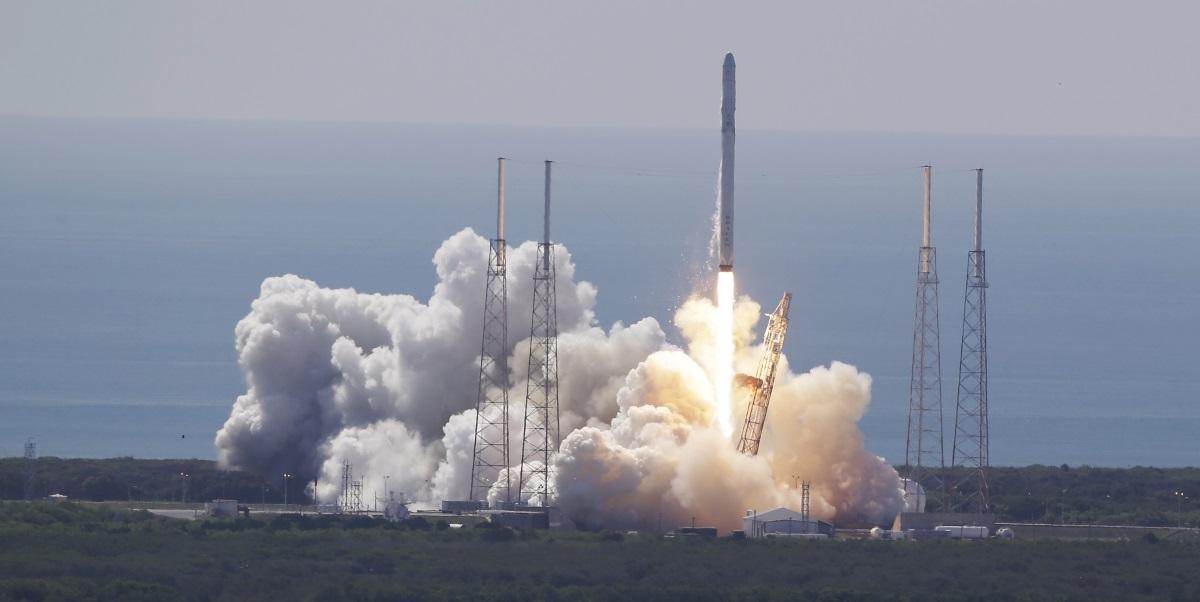Camden County Could Become Commercial Ga. ‘Space Coast’ Site

The SpaceX Falcon 9 rocket and Dragon spacecraft lifts off from Space Launch Complex 40 at the Cape Canaveral Air Force Station in Cape Canaveral, Fla., Sunday, June 28, 2015. Camden County could become the site of a new commercial spaceport.
JOHN RAOUX / AP Photo
Georgia could soon have its own space coast. Officials in Camden County, in the southeastern corner of the state, hope to build a commercial spaceport where companies could launch rockets. This is one of several spaceports either being proposed or already being built around the country as rural areas hope to cash in on the private space race.
‘Opportunity To Make History’
Camden County administrator and lead Spaceport Camden booster Steve Howard says whenever he presents the idea to an audience, he always starts off with a question:
“What did Camden County, Georgia and Frank Sinatra have in common in 1965?”
Then he pulls out a Life Magazine with Sinatra on the cover and flips to page 73, where there’s a full page article about a rocket test that happened in Camden County, conducted by the chemical company Thiokol, which had a plant there.
“The world’s largest thrust rocket engine was not test fired in California,” Howard says. “It wasn’t in Florida. It wasn’t in Virginia. It was in Camden County, Georgia, USA. We made history, and we have an opportunity to make history yet again.”
The new spaceport would go in the old Thiokol site, about 4,000 acres of very flat Georgia coastland on the Satilla River. Right now, there’s not much more than grass, trees and a lot of gnats just behind the fence around the site, though farther in there is some infrastructure left behind from the site’s industrial past. But Howard has a vision of rockets blasting off, connecting this rural spot on the Georgia coast to the International Space Station.
Meanwhile, there’s a bill in the state legislature that would make some state laws friendlier to space companies.
A Growing Industry
There are currently eight commercial spaceports up and running in the country. This is one of several more that are being proposed.
“I think a lot of the demand for spaceports is somewhat speculative,” says Micah Walter-Range, director of research and analysis for the Space Foundation, a pro-space industry non-profit.
Walter-Range values the global space industry at more than $300 billion. The current rush to build spaceports, he says, is in response to the growing demand for satellites. Companies want to get their GPS, phone, photo and video satellites into orbit, and they need places to launch them from.
Whether the small satellite portion of the industry will keep growing enough to sustain all the new spaceports that could open is still up in the air, he says.
One is already in financial trouble. Spaceport America in New Mexico failed to bring in the revenue it expected, and is now asking for millions of dollars from the state.
Georgia’s Space Strategy
It’s not just about building a single spaceport, says Georgia Tech aerospace professor Bobby Braun.
“The spaceport is not Georgia’s space strategy,” Braun says. “It’s one piece in Georgia’s space strategy. We need to also focus on growing startup companies in the space sector here in Georgia, and we need to focus on the idea of some companies moving into the area.”
Braun says, if a Georgia space coast is hard to imagine, just look a few hours south to Cape Canaveral.
“The Kennedy Space Center was not always the Kennedy Space Center,” he says. “It used to be largely coastal swamp land.”
Braun says Georgia Tech’s aerospace engineering school is the largest in the country, and he would like to see more of his students stay in Georgia after they graduate.
The proposed location could make that happen.
“The Camden site fills a very unique niche,” Braun says.
It combines a number of favorable attributes, he explains: It’s relatively close to the equator, which is good for rocket velocity. It’s near the water, which is convenient for barging in rockets. It’s set up for vertical launches, rather than horizontal. And it’s intended for private use.
“There is no other site in existence today that meets those characteristics,” Braun says.
Studying The Impact
There is opposition. People are concerned about how the spaceport would affect landowners and the environment. They’re worried about accidents. Some are unhappy with how the county has pitched this idea, saying it hasn’t shared enough information about costs and impacts.
The Federal Aviation Administration is studying the environmental impact of the idea, one of the required steps before the county can get a license to operate a spaceport.
Pending federal approval, Howard says his vision could be a reality in five years. He says he has had talks with multiple private space companies, though he won’t name names.
Howard says he dreams of a highway sign, greeting people driving into Georgia:
“Wouldn’t that be a great thing for Georgia if it said, ‘Welcome to Georgia’s space coast’?”








